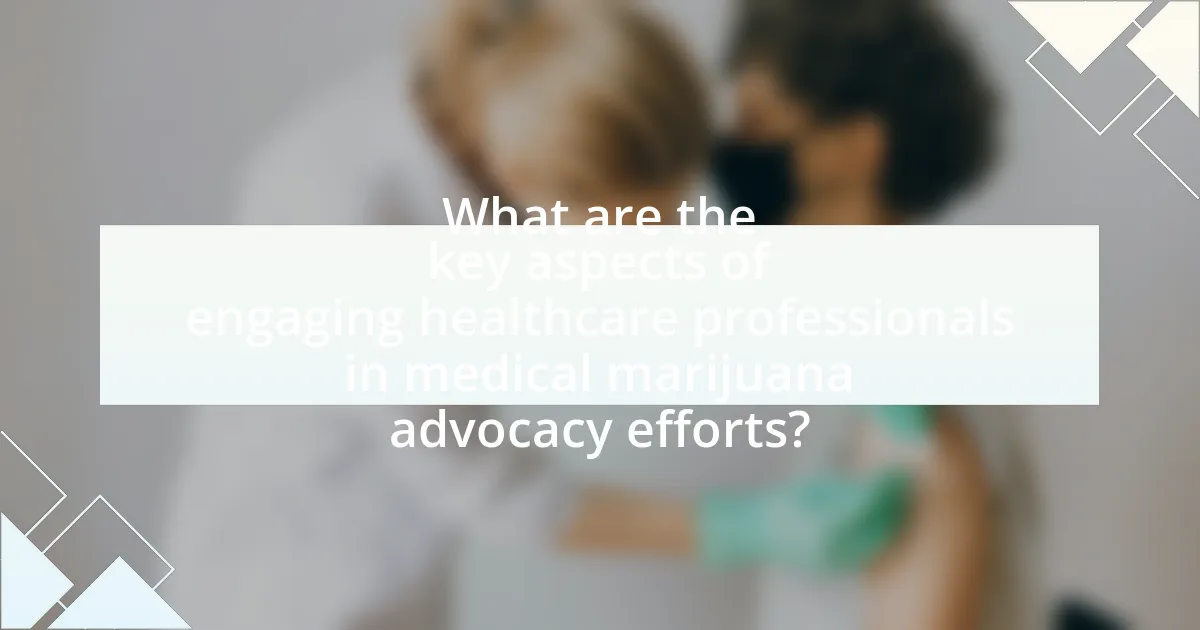The article focuses on the engagement of healthcare professionals in medical marijuana advocacy efforts, emphasizing the importance of trust, education, and collaboration. It outlines how healthcare professionals can influence public perception and policy changes regarding medical marijuana, while also addressing the challenges they face, such as legal restrictions and misconceptions. The article highlights strategies for effective advocacy, including interdisciplinary collaboration, social media utilization, and ongoing education, ultimately demonstrating how healthcare professionals can enhance patient access to medical marijuana and improve healthcare outcomes through informed advocacy.

What are the key aspects of engaging healthcare professionals in medical marijuana advocacy efforts?
Engaging healthcare professionals in medical marijuana advocacy efforts requires establishing trust, providing education, and fostering collaboration. Trust is built through transparent communication about the benefits and risks of medical marijuana, which is essential for healthcare professionals to feel confident in advocating for its use. Education plays a critical role, as healthcare professionals need access to up-to-date research and clinical guidelines to understand the therapeutic potential of medical marijuana; studies indicate that informed practitioners are more likely to support its use (e.g., the National Academies of Sciences, Engineering, and Medicine report on the health effects of cannabis). Collaboration with professional organizations and patient advocacy groups can enhance the credibility of advocacy efforts, creating a unified voice that can influence policy changes and improve patient access to medical marijuana.
Why is it important to involve healthcare professionals in medical marijuana advocacy?
Involving healthcare professionals in medical marijuana advocacy is crucial because they provide evidence-based insights and credibility to the discussion. Their expertise ensures that advocacy efforts are grounded in scientific research and clinical experience, which can help shape policies that prioritize patient safety and efficacy. For instance, a study published in the Journal of Pain Research highlights that healthcare providers play a key role in educating patients about the benefits and risks of medical marijuana, thereby facilitating informed decision-making. This involvement not only enhances the legitimacy of advocacy initiatives but also fosters trust among patients and the public, ultimately leading to more effective healthcare policies.
What role do healthcare professionals play in shaping public perception of medical marijuana?
Healthcare professionals play a crucial role in shaping public perception of medical marijuana by providing evidence-based information and guidance on its therapeutic benefits and risks. Their expertise helps to demystify medical marijuana, countering stigma and misinformation prevalent in society. For instance, studies show that when healthcare providers discuss medical marijuana with patients, it increases acceptance and understanding, as evidenced by a 2019 survey published in the Journal of Cannabis Research, which found that 70% of respondents felt more informed about medical marijuana after consultations with healthcare professionals. This direct engagement fosters a more informed public discourse, ultimately influencing policy and societal attitudes toward medical marijuana.
How can healthcare professionals influence policy changes regarding medical marijuana?
Healthcare professionals can influence policy changes regarding medical marijuana by leveraging their expertise to advocate for evidence-based regulations. They can provide clinical data and patient testimonials that highlight the therapeutic benefits of medical marijuana, thereby informing lawmakers and the public. For instance, a study published in the Journal of Pain Research in 2019 demonstrated that medical marijuana significantly reduced chronic pain in patients, which can serve as a compelling argument for policy reform. Additionally, healthcare professionals can participate in public forums, collaborate with advocacy groups, and engage in direct lobbying efforts to promote legislative changes that support medical marijuana use.
What challenges do healthcare professionals face in advocating for medical marijuana?
Healthcare professionals face significant challenges in advocating for medical marijuana, primarily due to legal restrictions, lack of comprehensive research, and stigma associated with cannabis use. Legal restrictions vary by state and can limit healthcare providers’ ability to prescribe or recommend medical marijuana, creating uncertainty in patient care. Additionally, the limited availability of rigorous clinical studies on the efficacy and safety of medical marijuana hinders healthcare professionals from making informed recommendations, as they often rely on evidence-based practices. Stigma surrounding cannabis use, both within the medical community and society at large, can also deter healthcare professionals from openly discussing or advocating for medical marijuana, fearing professional repercussions or loss of credibility. These factors collectively complicate the role of healthcare professionals in the advocacy for medical marijuana.
What are the common misconceptions about medical marijuana among healthcare professionals?
Common misconceptions about medical marijuana among healthcare professionals include the belief that it is not effective for treating serious medical conditions, that it is highly addictive, and that it lacks scientific research backing its use. Many healthcare professionals underestimate the therapeutic potential of cannabinoids, despite studies indicating efficacy in conditions like chronic pain, epilepsy, and multiple sclerosis. Additionally, the misconception of high addiction potential is contradicted by research showing that the addiction rate for cannabis is lower than that of substances like opioids and alcohol. Furthermore, the perception that there is insufficient scientific evidence is inaccurate, as numerous peer-reviewed studies and clinical trials have demonstrated the benefits and safety of medical marijuana, as highlighted in reports from the National Academies of Sciences, Engineering, and Medicine.
How do legal and regulatory barriers impact healthcare professionals’ advocacy efforts?
Legal and regulatory barriers significantly hinder healthcare professionals’ advocacy efforts by restricting their ability to discuss and promote medical marijuana. These barriers often include stringent laws that limit the prescription and use of cannabis, creating a climate of fear among professionals regarding potential legal repercussions. For instance, in states where medical marijuana is not legalized, healthcare providers may face disciplinary actions or loss of licensure for advocating its use, which discourages open dialogue and education on the subject. Additionally, the federal classification of marijuana as a Schedule I substance complicates research and limits access to evidence-based information, further impeding healthcare professionals’ ability to advocate effectively.

How can healthcare professionals be effectively engaged in medical marijuana advocacy?
Healthcare professionals can be effectively engaged in medical marijuana advocacy by providing them with comprehensive education on the therapeutic benefits and legal implications of medical cannabis. This education can include evidence-based research, case studies, and updates on evolving legislation, which empower healthcare providers to make informed recommendations to patients. For instance, a study published in the Journal of the American Medical Association found that healthcare providers who received training on medical marijuana were more likely to discuss it with patients and recommend it when appropriate. By fostering a supportive environment that encourages open dialogue and collaboration among healthcare professionals, advocacy efforts can be strengthened, leading to better patient outcomes and increased acceptance of medical marijuana in clinical practice.
What strategies can be employed to educate healthcare professionals about medical marijuana?
To educate healthcare professionals about medical marijuana, targeted training programs and continuing education courses should be implemented. These programs can provide evidence-based information on the pharmacology, therapeutic uses, and legal considerations of medical marijuana. For instance, the American Medical Association has advocated for educational initiatives that include workshops and seminars led by experts in cannabinoid medicine. Additionally, integrating medical marijuana education into existing medical curricula can ensure that future healthcare providers are well-informed. Research indicates that healthcare professionals who receive formal training are more likely to discuss medical marijuana with patients, thereby improving patient care and outcomes.
How can continuing education programs be designed to include medical marijuana topics?
Continuing education programs can be designed to include medical marijuana topics by integrating evidence-based curricula that cover the pharmacology, therapeutic uses, and legal considerations of medical marijuana. This approach ensures that healthcare professionals receive comprehensive training that reflects current research and clinical practices. For instance, the National Academies of Sciences, Engineering, and Medicine published a report in 2017 highlighting the health effects of cannabis and cannabinoids, which can serve as a foundational resource for developing educational content. Additionally, incorporating case studies and real-world applications can enhance understanding and relevance, allowing healthcare providers to engage effectively with patients regarding medical marijuana.
What role do professional organizations play in advocating for medical marijuana education?
Professional organizations play a crucial role in advocating for medical marijuana education by providing resources, guidelines, and training for healthcare professionals. These organizations, such as the American Medical Association and the American Nurses Association, actively promote evidence-based practices and facilitate discussions on the therapeutic benefits and risks of medical marijuana. They also engage in policy advocacy to influence legislation and regulations surrounding medical marijuana use, ensuring that healthcare providers are informed and equipped to make educated decisions regarding patient care. For instance, the American Academy of Family Physicians has published position statements and educational materials that support the integration of medical marijuana into clinical practice, highlighting the importance of ongoing education in this evolving field.
How can collaboration among healthcare professionals enhance advocacy efforts?
Collaboration among healthcare professionals enhances advocacy efforts by fostering a unified approach to patient care and policy influence. When healthcare professionals work together, they can share expertise, resources, and insights, which strengthens their collective voice in advocating for medical marijuana policies. For instance, a study published in the Journal of Cannabis Research highlighted that interdisciplinary collaboration among physicians, nurses, and pharmacists led to more comprehensive patient education and improved outcomes in medical marijuana use. This collaborative effort not only amplifies the message but also builds credibility and trust within the community, ultimately leading to more effective advocacy initiatives.
What are the benefits of interdisciplinary approaches in medical marijuana advocacy?
Interdisciplinary approaches in medical marijuana advocacy enhance the effectiveness of advocacy efforts by integrating diverse expertise and perspectives. This collaboration among healthcare professionals, researchers, policymakers, and advocates leads to comprehensive understanding and communication of medical marijuana’s benefits and risks. For instance, a study published in the Journal of Cannabis Research highlights that interdisciplinary teams can better address complex patient needs, improve educational outreach, and influence policy changes more effectively than single-discipline efforts. By combining knowledge from various fields, these approaches foster evidence-based practices and promote informed decision-making, ultimately benefiting patients and the broader healthcare system.
How can healthcare professionals leverage social media for advocacy purposes?
Healthcare professionals can leverage social media for advocacy purposes by sharing evidence-based information, engaging with the community, and mobilizing support for medical marijuana initiatives. By utilizing platforms like Twitter, Facebook, and Instagram, healthcare professionals can disseminate research findings, highlight patient stories, and raise awareness about the benefits and challenges of medical marijuana. For instance, a study published in the Journal of Medical Internet Research found that healthcare professionals who actively engage on social media can significantly influence public perception and policy discussions regarding medical marijuana. This engagement not only educates the public but also fosters a supportive network that can advocate for legislative changes and improved patient access to medical marijuana.

What are the outcomes of successful engagement of healthcare professionals in medical marijuana advocacy?
Successful engagement of healthcare professionals in medical marijuana advocacy leads to improved patient access to medical cannabis, enhanced public awareness, and informed policy development. When healthcare professionals actively participate in advocacy, they can educate patients about the benefits and risks of medical marijuana, which increases patient confidence in its use. Additionally, their involvement can influence legislative changes, as seen in states where medical marijuana laws have been shaped by healthcare input, resulting in more comprehensive and patient-centered regulations. This engagement also fosters collaboration among medical professionals, researchers, and policymakers, ultimately contributing to a more robust understanding of medical marijuana’s therapeutic potential.
How does healthcare professional advocacy impact patient access to medical marijuana?
Healthcare professional advocacy significantly enhances patient access to medical marijuana by influencing policy changes and educating both patients and lawmakers. When healthcare professionals advocate for medical marijuana, they provide credible information that can lead to the development of more favorable regulations and increased acceptance within the medical community. For instance, studies have shown that states with active healthcare professional advocacy groups tend to have more comprehensive medical marijuana laws, which directly correlates with improved patient access. Additionally, healthcare professionals can guide patients through the legal and medical complexities of obtaining medical marijuana, ensuring that patients receive the necessary support and resources.
What evidence exists to support improved patient outcomes through professional advocacy?
Evidence supporting improved patient outcomes through professional advocacy includes studies demonstrating that healthcare professionals advocating for medical marijuana can lead to increased patient access and better management of chronic pain. For instance, a study published in the Journal of Pain Research found that patients who received guidance from healthcare providers on medical marijuana reported a 64% reduction in pain levels. Additionally, research from the American Journal of Public Health indicated that states with active medical marijuana advocacy saw a 25% decrease in opioid prescriptions, suggesting that professional advocacy not only enhances patient education but also promotes safer pain management alternatives. These findings underscore the positive impact of professional advocacy on patient outcomes in the context of medical marijuana.
How can advocacy efforts lead to changes in medical marijuana legislation?
Advocacy efforts can lead to changes in medical marijuana legislation by mobilizing public support, influencing policymakers, and providing evidence-based research to demonstrate the benefits of medical marijuana. For instance, organized campaigns by advocacy groups have successfully raised awareness about the therapeutic benefits of medical marijuana, leading to legislative changes in various states. A notable example is the 2016 legalization of medical marijuana in Florida, which was largely driven by grassroots advocacy efforts that highlighted patient testimonials and scientific studies supporting its efficacy. These efforts often include lobbying activities, public demonstrations, and collaboration with healthcare professionals to present a united front, thereby increasing the likelihood of legislative reform.
What best practices can healthcare professionals adopt for effective advocacy?
Healthcare professionals can adopt several best practices for effective advocacy, including staying informed about medical marijuana legislation, engaging with patients to understand their needs, and collaborating with interdisciplinary teams. Staying informed allows healthcare professionals to provide accurate information and guidance regarding medical marijuana, which is crucial given the evolving legal landscape. Engaging with patients fosters trust and helps professionals advocate for policies that reflect patient needs and experiences. Collaboration with interdisciplinary teams enhances the effectiveness of advocacy efforts by combining diverse expertise and perspectives, ultimately leading to more comprehensive advocacy strategies.
How can healthcare professionals stay informed about the latest research on medical marijuana?
Healthcare professionals can stay informed about the latest research on medical marijuana by subscribing to peer-reviewed journals, attending relevant conferences, and participating in professional organizations focused on cannabis research. For instance, journals like “Cannabis and Cannabinoid Research” publish studies that provide evidence-based insights into medical marijuana. Additionally, conferences such as the “International Cannabinoid Research Society Annual Symposium” offer opportunities for healthcare professionals to engage with experts and learn about cutting-edge research. Professional organizations, like the American Academy of Cannabinoid Medicine, provide resources and updates on the latest findings, ensuring that healthcare providers remain knowledgeable about advancements in the field.
What are the key communication strategies for discussing medical marijuana with patients?
Key communication strategies for discussing medical marijuana with patients include establishing trust, providing clear and accurate information, and actively listening to patient concerns. Establishing trust is crucial as it fosters an open dialogue, allowing patients to feel comfortable discussing their medical needs and experiences. Providing clear and accurate information involves explaining the benefits, risks, and legal status of medical marijuana, supported by evidence from studies such as the National Academies of Sciences, Engineering, and Medicine report, which found substantial evidence that cannabis is effective for chronic pain management. Actively listening to patient concerns ensures that healthcare providers can address specific questions and misconceptions, enhancing patient understanding and engagement in their treatment options.
What resources are available for healthcare professionals interested in medical marijuana advocacy?
Healthcare professionals interested in medical marijuana advocacy can access a variety of resources, including professional organizations, educational programs, and research publications. Organizations such as the American Medical Association and the American Nurses Association provide guidelines and advocacy tools specific to medical marijuana. Educational programs, like those offered by universities and medical schools, often include courses on cannabis medicine and its therapeutic applications. Additionally, research publications from journals such as the Journal of Cannabis Research and the Cannabis and Cannabinoid Research journal offer evidence-based studies that support advocacy efforts. These resources collectively equip healthcare professionals with the knowledge and tools necessary to engage effectively in medical marijuana advocacy.
What organizations provide support and information for healthcare professionals advocating for medical marijuana?
Organizations that provide support and information for healthcare professionals advocating for medical marijuana include the American Medical Association (AMA), the American Academy of Family Physicians (AAFP), and the Society of Cannabis Clinicians (SCC). The AMA has published policies endorsing the use of medical marijuana and encourages research into its benefits and risks. The AAFP offers resources and guidelines for family physicians regarding cannabis use in clinical practice. The SCC focuses on education and advocacy for healthcare professionals, providing a platform for sharing research and clinical experiences related to cannabis. These organizations collectively contribute to the professional development and informed advocacy of healthcare providers in the medical marijuana field.
How can healthcare professionals access research and data on medical marijuana efficacy?
Healthcare professionals can access research and data on medical marijuana efficacy through academic databases, peer-reviewed journals, and government resources. Notable databases include PubMed, which offers access to a wide range of studies, and the Cochrane Library, known for systematic reviews. Additionally, the National Institutes of Health (NIH) and the National Library of Medicine provide comprehensive resources and research findings on medical marijuana. For example, a systematic review published in the Journal of the American Medical Association (JAMA) in 2015 analyzed the efficacy of cannabinoids for chronic pain, highlighting the importance of evidence-based research in clinical practice.

Leave a Reply